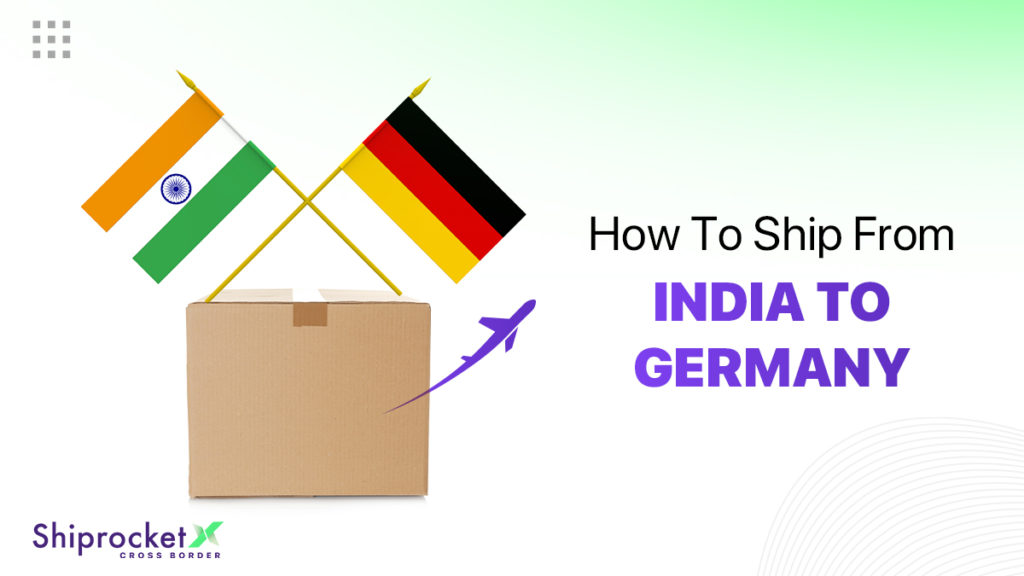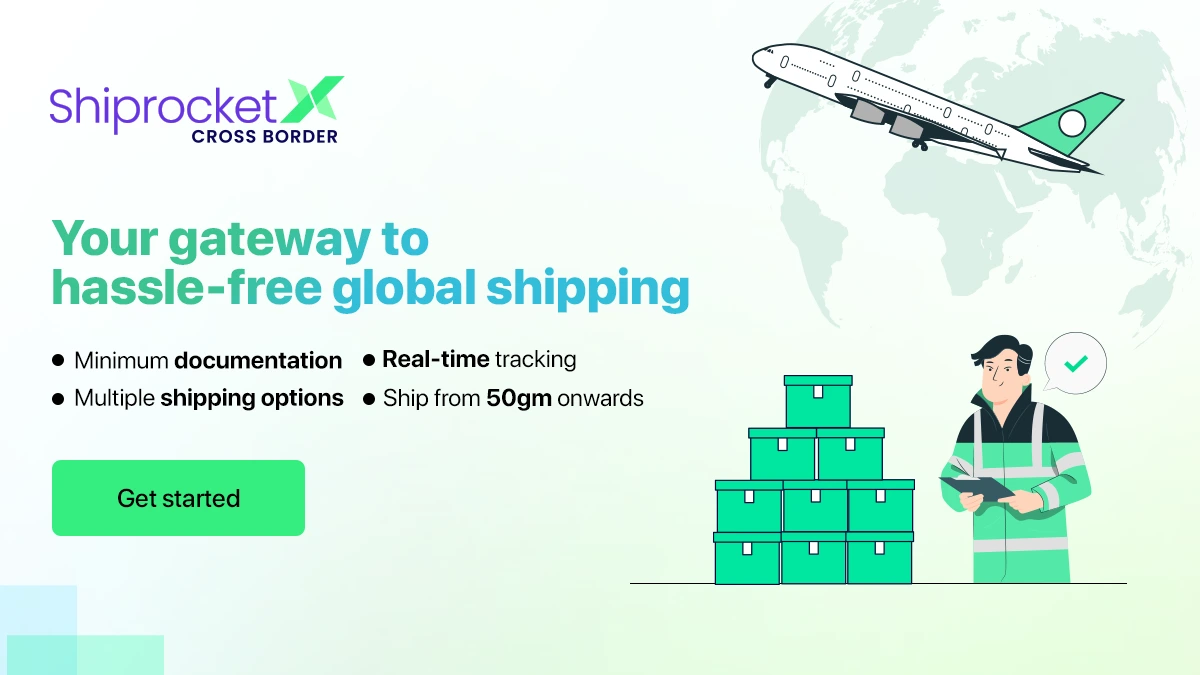How to Export to Germany from India: Step by Step Process
- Why Should You Export from India to Germany?
- What Does Germany Import?
- Countries That Export To Germany The Most
- What Does India Export To Germany?
- Potential Opportunities to Export to Germany
- Documents Required for Exporting to Germany
- Custom Tariffs On Exported Goods To Germany
- How To Export To Germany From India?
- Products Needing Government Approval to Export to Germany
- Challenges You Might Face While Exporting to Germany
- Compliance Issues When Exporting from India to Germany
- Important Shopping Dates in Germany
- Popular German eCommerce Platforms in Germany
- Export to Germany – Get Started with Shiprocket
If exporting to Germany is your next business goal, you probably have to spend a lot of time on the research and development of the entire process.
As appealing as it sounds, getting your business export-ready and well-positioned for commercial success abroad may be challenging. However, choosing a reliable shipping company that can adapt and scale its services accordingly will ensure seamless transitions and minimise disruptions in your supply chain.
In addition to analysing the a country’s regulations and finding the right shipping partners, there’s a lot to consider. Factors like shipping costs, capital custom formalities, market behaviour analysis, profitability, and insurance generally add to a lot of homework that your business needs to conduct.
In this guide, we will walk you through all the fundamentals of exporting to Germany and building the presence of your business there.

Why Should You Export from India to Germany?
Being one of the largest world economies, Germany is a modern, diverse country with stable markets. Germany has the largest economy in Europe, ranking third globally by nominal GDP and fifth by GDP (PPP). From machines to chemicals, this country produces a lot of its goods.
With a trade history that spans 500+ years, Germany is one of India’s largest trading partners in Europe and worldwide. If you run an eCommerce business, here is some good news for you. You do not need a physical store or a warehouse to sell your goods in Germany; choosing a shipping company like ShiprocketX enables you to select the pickup option from your location and deliver it to the destination hassle-free.
Introducing your product in the German markets means equipping your business with some of the most sought-after benefits, which include:
- Business incentives: Germany has more than 2.6 million small to medium-sized enterprises (SMEs). Due to the presence of these growing companies, cracking a business deal with them and growing your business alongside is easy compared to the rest of the countries.
- An ideal location: Since Germany is located in the heart of Europe, it has a proper connection with the established markets in central and eastern Europe. This gives you better access to the neighboring markets.
- An international dominance: The German government makes it easy for workers to acquire visas, allowing small businesses to attract a proficient global workforce. Moreover, its stable legal environment, reliable infrastructure, world-class research and development, and surrounding emerging markets make it one of the most attractive countries for foreign investments.
- Enhanced quality of life: With more than 13 million migrants settled in Germany right now, the quality of life in Germany is commendable. It is a country with countless opportunities in other sectors and a modern society with great incentives in the medical and education fields.
While these factors can convince you to start exporting to Germany, consider the following factors before shipping your first batch of products.
What Does Germany Import?
Germany imported goods valued at 1,352.6 billion euros in 2023, down 10.2% in 2022, still making it the third largest importer after the USA and China. However, this industry is expected to grow in the coming years, making it a perfect time to start exporting to Germany.
Some of the most imported products by Germany include:
- Electric and machine equipment
- Technological equipment
- Vehicles
- Minerals and fuels
- Pharmaceuticals
- Plastics and plastic articles
- Optical and medical apparatus
- Gems and other precious metals
- Organic chemicals
- Iron and steel
Germany’s most imported products in 2023 were electrical and electronic equipment, worth $222.11 billion. Because Germany is a major manufacturer of many products globally, the rise in imports is also inevitable.
Countries That Export To Germany The Most
Germany’s economy is a highly developed social market economy, ranking as the third largest national economy in Europe. Moreover, it is also the United States’ largest European trading partner and the sixth-largest market for US exports.
Besides, being the third largest exporter in the world after the USA and China, most of the export industry of Germany is accounted for by Europe. Accounting for more than 70% of the export volume, Europe is still the top exporter for Germany. On the other hand, the Asian countries contribute about 20% to Germany’s export volume.
If your products have qualitative or cost-based advantages over European products, it has a great chance of finding a place on the shelves of Germany.
Some of the top exporting countries to Germany are:
- Netherlands – equating to around 10% of Germany’s imports
- China – equating to around 8.9% of Germany’s imports
- France – equating to around 7.5% of Germany’s imports
- United States – equating to around 5.4% of Germany’s imports
- Italy – equating to around 5.4% of Germany’s imports
What Does India Export To Germany?
The Indian-German export industry is roughly valued at $14 billion. Even though India is not the primary exporter of goods and services to Germany, it still plays an important role in its economy.
The last decade has witnessed a significant improvement in India and Germany’s economic and political spheres. One of the biggest outcomes of this increased relationship strength could be seen in the import-export industry of both countries.
Germany is now one of India’s most important global partners. Since Germany is the largest trading partner in Europe, and 5th biggest trading partner in the world, for India, it has also opened a route for German investors to partake in the Indian companies.
India has welcomed investments in electrical equipment, transportation, services sectors, and automobiles from Germany. On the other hand, some of the top Indian products exported to Germany belong to the following industries:
- Food and beverages
- Textiles
- Metal and metal products
- Electronics and technology
- Leather and its goods
- Jewellery
- Rubber products
- Automobile components
- Chemicals
- Medical resources
Potential Opportunities to Export to Germany
The lucrative opportunities of exporting to Germany outweigh all the challenges you face in the entire process. It is important to identify the best opportunities that help you reap the potential gains while building a strategy to minimise risks.
Exporting to Germany can let you count on high levels of productivity, proficient, skilled staff, robust infrastructure, quality engineering, and a strategic, central location in Europe to expand your network with other EU countries.
Undoubtedly, Germany will be a robust market for technology in the immediate future. Thus, a few high-potential sectors in which you can build a successful export business in Germany include:
- ICT/software
- Cybersecurity
- Smart/safer cities
- Consulting services
- Digital services
- Smart energy, renewables, and storage services
- IOT/AI Green technologies
- Healthcare: Providing digital health solutions, medical devices, and safety/security technologies
One of the best things about exporting to Germany is the assistance from your in-country allies, including the Chambers of Commerce, Trade Missions, District Export Councils, the US Commercial Service Officer, and the International Trade Administration (ITA).
Documents Required for Exporting to Germany
You may need different documents when exporting to Germany, depending on the products. However, some documents are commonly required, no matter what products you export. So, here is the checklist you must include with your shipment before exporting your products to Germany or other countries:
- Export Declaration: This documents needs to be submitted to and approved by customs authorities before your goods are shipped from the origin country.
- Commercial invoice: This is a record that lists and details products delivered overseas. It is essential for verifying trade transactions and clearing customs.
- Airway bill: It is used as a receipt for products shipped by air. Airlines issue this document that details the shipment’s origin, destination, contents, and terms of transport.
- Bill of lading: It is an acknowledgment of receiving the cargo by the shipper for transportation. It specifies the terms of transit.
- Export licence: It is a formal document issued by a governing body that authorises the shipment of particular products or technologies from one nation to another.
- Packing list: It is a comprehensive record used for logistics and customs clearance that lists every detail of a shipment, including amounts, weights, measurements, and kind of packing.
- Sales contract: It is a formal agreement between a buyer and seller that specifies the terms and conditions of a transaction, such as the cost, the time of delivery, and the mode of payment.
- Proforma invoice: This is a formal offer or quotation delivered to a customer prior to shipment. It lists the goods or services to be supplied, their quantities, pricing, and terms.
- Insurance policy: This coverage offers monetary compensation to the insured parties in the event that items are lost, damaged, or stolen while being transported across nations.
- Certificate of origin: This document attests to the nation in which the exported goods were produced or processed.
Custom Tariffs On Exported Goods To Germany
Just like in other countries, exporting to Germany is subject to a few customs procedures and laws imposed by the German authorities. If you export goods to Germany through a non-EU state, you must pay an additional 19% turnover tax.
But on the brighter side, items that are of value up to 150 euros can be exported to European countries, including those shipped to Germany, without any customs duty charges.
The following transactions in Germany usually attract the value-added tax:
- Supply of goods/services made by a taxable person in Germany
- Reverse charge supplies, including installation services
- Self-supply of goods by a taxable person
- Importing goods from outside the EU
The German government has also imposed restrictions on importing farm products. This happened in the wake of the European Union adopting the Common Agricultural Policy.
How To Export To Germany From India?
India is a renowned country known for manufacturing diverse products in categories including handicrafts, leather goods, tobacco, jewellery, textiles, and more.
Thinking about how to export to Germany from India? We will make the entire export process easy for you by letting you know the primary things you should focus on.
Before you start exporting, it is essential to determine the customs regulations in advance. You can do this with the customs tariff number. This will help you know whether your goods fall into a specially regulated category, and if they do, then they can be registered with SECO (State Secretariat for Economic Affairs).
For instance, sugar tax is being discussed in Germany, which can make sugar products more expensive and decrease sugar-sweetened beverages and other food consumption. Therefore, you must know about all the regulations before exporting your products to avoid unexpected hurdles.
Another important thing you need to consider is the type of products you export to Germany and whether they can be sold without requiring certification. For instance, all electrical appliances and personal protective equipment need certification to be sold in the German market.
You can gain a competitive edge over your exports to Germany by focusing on improved quality products, at least better than those of the EU states. With the Indian government providing multiple schemes to help export businesses, now is the right time to start considering methods to start expanding your business to countries like Germany.
You are also advised to register your trademark to prevent duplicates and build your brand authority.
As part of your R&D, you also need to determine factors like an economic framework, the capital required, the tariffs involved, the behaviour of the customers with your products, and the right ways of shipping your products.
Thankfully, ShiprocketX has made it easy to export products globally. It is a courier platform with a unified tracking feature for its international business partners that makes exporting your products easy.
This cross-border shipping platform provides access to sell your products to 220+ global locations, including Germany. The best part is it provides you with an on-page international shipping rate calculator that allows you to compare rates and instantly opt for the services.
Products Needing Government Approval to Export to Germany
The following products require prior government agency approval or additional documents if you want to start exporting your Indian goods to German markets:
- Alcoholic beverages
- Food
- Controlled chemicals
- Animal fuel (natural)
- Biological substances (Category B UN3373)
- Animals and plants
- Infectious goods
- Chemicals
- Cigarettes, cigars, and e-cigarettes
- Rice, frozen or chilled meat, and eggs
- Tea
- Dutiable commodities
- Coffee
- Cosmetics
- Pharmaceutical products
- Radio equipment
- Drugs
- Electronic equipment
- Hazardous chemicals
- Alternative smoking products
- Foodstuff
- Jewellery
- Medical samples and equipment
- Perishables
- Plants
- Seeds
- Textiles
- Toy guns
Challenges You Might Face While Exporting to Germany
Germany has a higher cost of doing business compared to many other countries. Besides, there are some other challenges you may face while exporting your products from India to Germany:
- Germany is an attractive market for investors, and new and established business owners. However, its bureaucratic system can be complex and time-consuming. For instance, compliance, specifically for new ventures, can be challenging.
- The acceptance of the EU’s Common Agricultural Policy and German restrictions on biotech agricultural products for US products make this regulation complex. This may offer a degree of protection to local suppliers of the country.
- Germany is known to have a skilled workforce. However, its labour laws are not flexible, making it challenging to adjust staffing levels easily.
- Germany’s rigorous application can increase the complexity of submitting the required documents. Moreover, exporting your products to Germany, according to safety and environmental standards, can complicate access to the US products market.
Compliance Issues When Exporting from India to Germany
You must know about all the regulations to ensure export compliance while exporting to Germany from India:
1. Product Classification
It is the first and the most crucial step in determining who has jurisdiction over your products. It can be either under the State Department’s International Traffic in Arms Regulations (ITAR) or the U.S. Department of Commerce under Export Administration Regulations (EAR).
In most scenarios, the products will fall under the Commerce Department. If it does, you need to get authorisation from the Bureau of Industry and Security (BIS, part of the Commerce Department) by having the answers to all these questions, including:
What is the Export Control Classification Number (ECCN) of the product?
- Where is your product going?
- Who is the end user of your product?
- What is the use of the product you are selling?
You can classify your products either by relying on the product vendor to provide the information or by submitting a SNAP-R request. Make sure to follow these steps to classify your products to avoid paying fines, penalties, and even jail time.
2. Export License
Before exporting your goods to Germany or any other country, one of the essential things to determine is if that country imposes any restrictions. For this, you need to use the ECCN codes and reasons for control described above. Once you know your products are controlled, you must determine if a license is required. For this, you can refer to the Commerce Country Chart in the EAR.
3. Deemed Exports
Deemed exports are transactions in which the products are supplied so they do not leave the point of origin, and the payment for such supplies is received in foreign exchange or INR.
Leveraging IT solutions, conducting tours of facilities, reviewing blueprints, and other information disclosures are categorised as potential exports under the deemed export rule and should be handled accordingly.
4. Restricted Party Screenings
Restricted Party Screenings seek to identify parties that U.S agencies or other foreign governments have prohibited from doing business with. All the parties who are banned cannot receive the items subject to export control regulations unless the exporter secures the license.
So, before you export your goods to Germany, you must screen all contacts against this list.
Important Shopping Dates in Germany
Knowing these key shopping dates for German customers will help you cater to their diverse needs efficiently:
- Valentine’s Day- February 14th
- Easter- March/April
- Glamour Shopping Week- April & October
- Cyber Week & Black Friday- October
- Christmas- December 24th to 26th
Popular German eCommerce Platforms in Germany
Listed below are some of the most top-rated and renowned eCommerce platforms in Germany:
Export to Germany – Get Started with Shiprocket
If you are interested in exporting your products to Germany, you must conduct extensive market research and make sure the contracts are in agreement with the EU and member state laws.
To conduct market research and realise the potential to sell your products, you can also participate in Germany’s international trade fairs that are hosted for almost every business sector.
Leveraging efficient shipping platforms like ShiprocketX to expand your audience and reach German customers simplifies the whole export process.
Opting for ShiprocketX’s services ensures you are offered low freight rates as it partners with numerous courier partners. You will also receive real-time updates on all orders in transit via WhatsApp, email, and SMS. Best part? The platform also provides door-to-door deliveries with B2B delivery access without imposing any weight restrictions.








